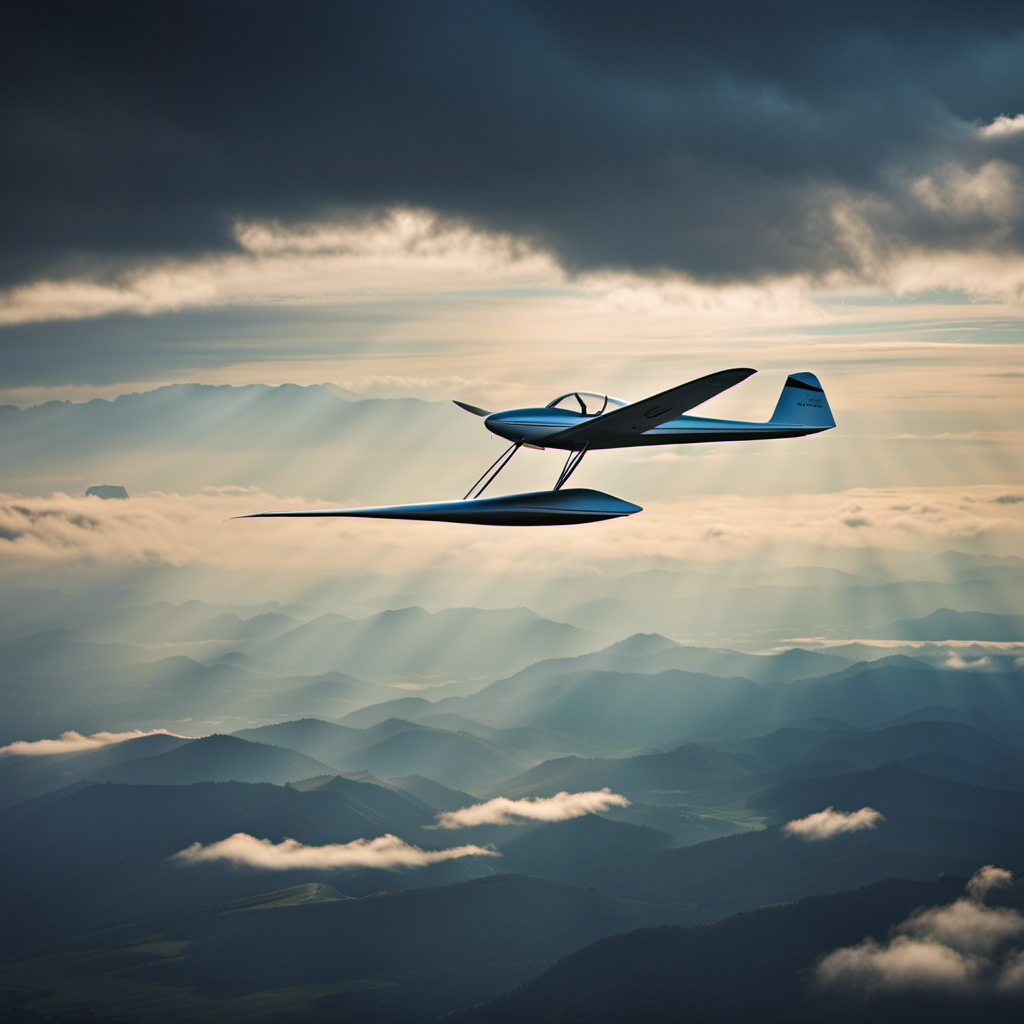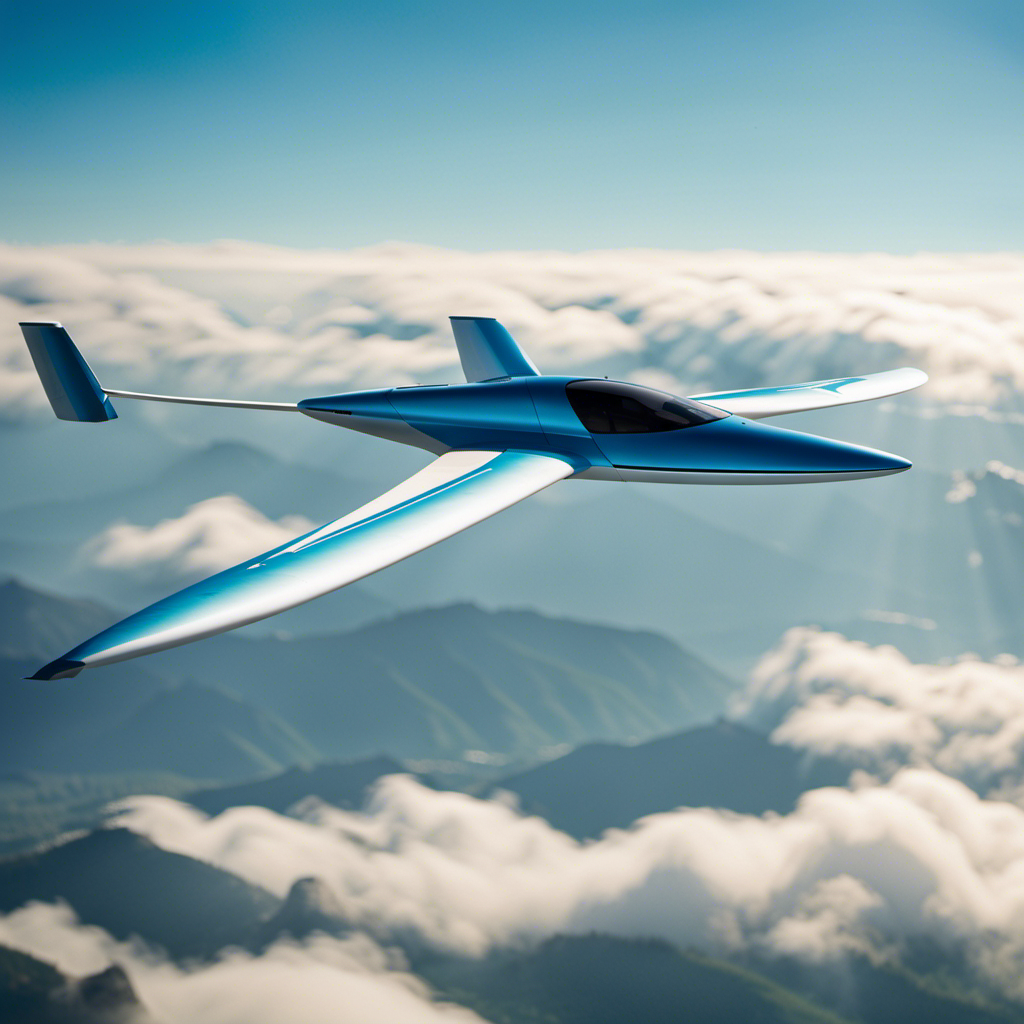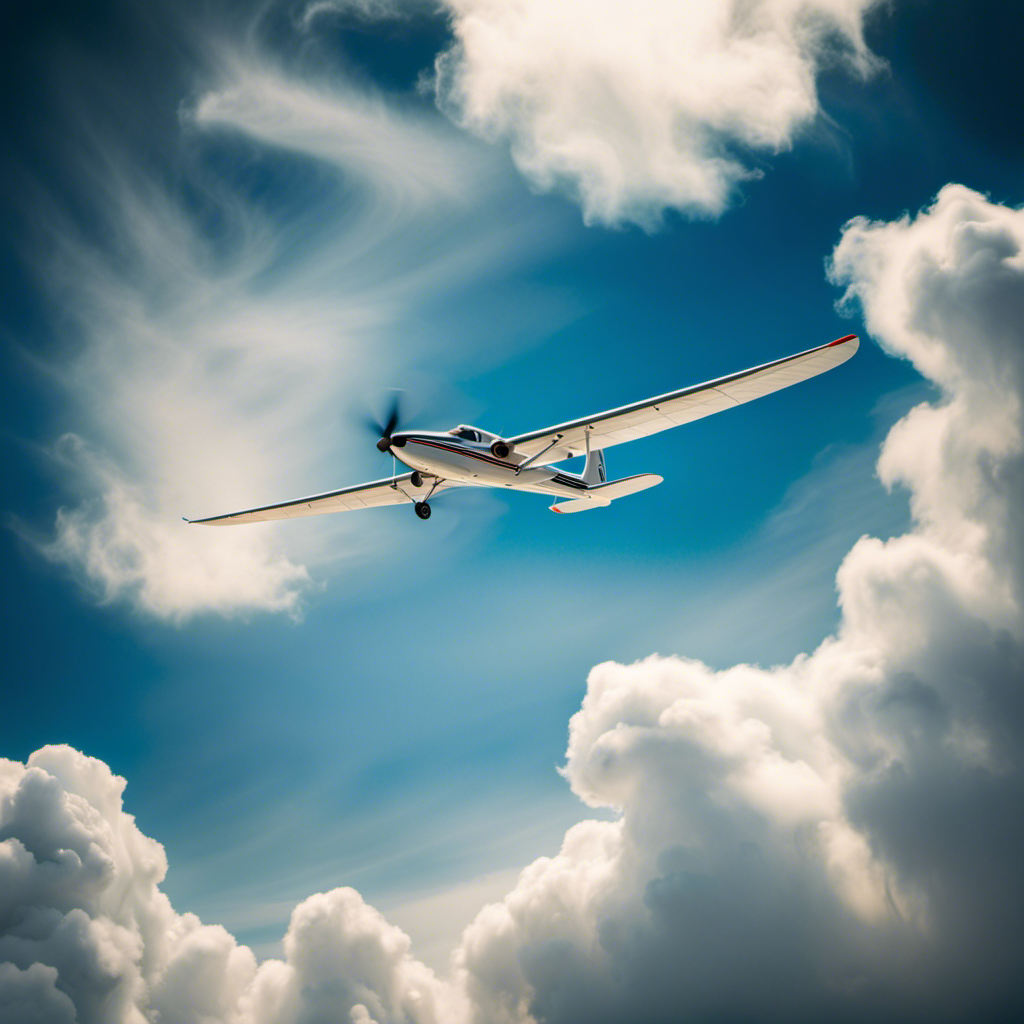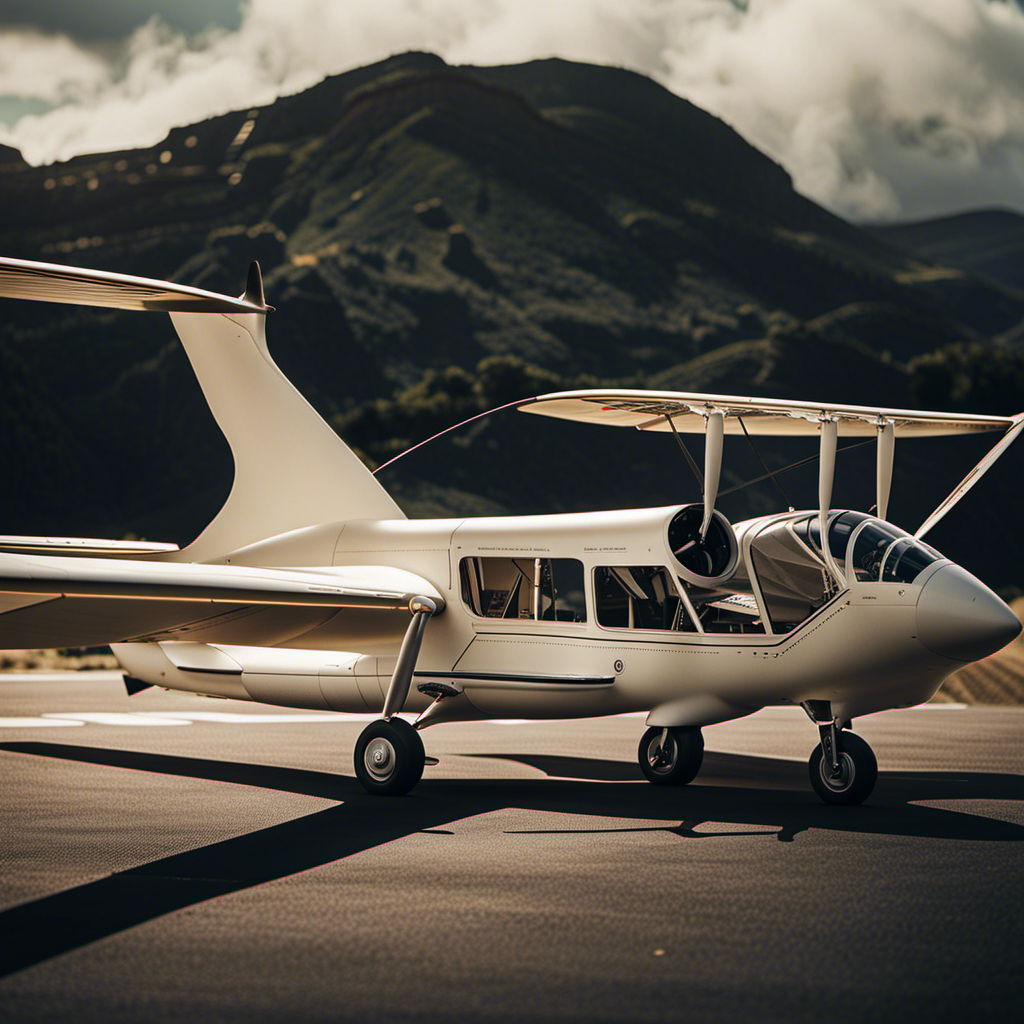As a passionate glider enthusiast, I have always been captivated by the graceful art of soaring through the skies. The introduction of electric motor gliders fills me with excitement, as I witness the beginning of a new, environmentally friendly era in the world of aviation.
These remarkable aircraft combine the beauty of gliding with the efficiency and power of electric propulsion. In this article, we’ll explore the environmental benefits, cost savings, and advancements in technology that make electric motor gliders the future of gliding.
So buckle up and get ready to soar into a world of innovation and renewable energy initiatives.
Key Takeaways
- Electric motor gliders combine gliding with electric propulsion, providing additional power and maneuverability while reducing reliance on fossil fuels and producing less noise pollution.
- Advancements in electric propulsion technology revolutionize gliders to be more sustainable and environmentally friendly, significantly reducing noise pollution and increasing efficiency and range for longer flight times.
- Enhanced safety features, such as redundancy systems and emergency power options, ensure reliability of critical components and provide a more secure and reliable flying experience.
- Electric motor gliders have various applications, including aerial photography, search and rescue operations, environmental research and monitoring, and support for renewable energy initiatives, contributing to a greener and more sustainable aviation industry.
Introduction to Electric Motor Gliders
Electric motor gliders offer a more environmentally friendly alternative to traditional gliders. With advancements in electric propulsion technology, the electric motor glider market has been steadily growing. These gliders are equipped with an electric motor that provides additional power, allowing for extended flight durations and increased maneuverability.
The benefits of electric propulsion are numerous. Firstly, it reduces reliance on fossil fuels, leading to lower emissions and a smaller carbon footprint. Additionally, electric motor gliders produce less noise pollution, making them more suitable for urban areas and wildlife conservation areas. Furthermore, the electric motor glider market has seen advancements in battery technology, resulting in longer flight times and improved efficiency. This makes electric motor gliders a promising solution for sustainable aviation.
Transitioning into the next section, let’s explore the environmental benefits of electric motor gliders.
Environmental Benefits of Electric Motor Gliders
By utilizing electric motor gliders, we can significantly reduce carbon emissions, creating a cleaner and more eco-friendly method of flight.
Electric motor gliders are an innovative solution that combines the benefits of gliding and electric propulsion. These gliders are equipped with electric motors that provide silent and efficient power, eliminating the need for noisy and polluting engines.
Not only do electric motor gliders reduce noise pollution, but they also have a positive impact on the environment by reducing carbon emissions. This makes them a cost-effective and sustainable alternative to traditional gliders.
The use of electric motors allows for longer flight times and increased range, enabling pilots to explore new areas and enjoy the beauty of soaring through the sky. Moreover, the minimal maintenance requirements of electric motor gliders contribute to their cost effectiveness and overall efficiency.
Transitioning into the next section, let’s explore the efficiency and cost savings associated with electric motor gliders.
Efficiency and Cost Savings
When it comes to efficiency and cost savings, you’ll be pleased to discover the benefits of utilizing electric motor gliders. These innovative aircraft combine the advantages of gliding with the power of electric motors, resulting in a more sustainable and economical flying experience. Here are some key reasons why electric motor gliders are a game-changer:
-
Longer flight duration: With improving battery technology, electric motor gliders can stay in the air for extended periods, reducing the need for frequent refueling.
-
Lower operating costs: Compared to traditional fuel-powered gliders, electric motor gliders have significantly lower operating costs, thanks to the use of renewable energy sources.
-
Reduced environmental impact: By integrating renewable energy sources, such as solar power, electric motor gliders contribute to a greener aviation industry.
-
Quieter operation: Electric motors produce less noise compared to combustion engines, making electric motor gliders more environmentally friendly and less disruptive to communities.
-
Enhanced flight control: Electric motor gliders offer improved maneuverability and control, allowing pilots to optimize their flight paths and save energy.
With these advantages, it’s clear that electric motor gliders are revolutionizing the gliding industry. Now, let’s explore the advancements in electric propulsion technology that are further propelling this sustainable future.
Advancements in Electric Propulsion Technology
To fully embrace the benefits of electric motor gliders, you should explore the latest advancements in propulsion technology. These advancements have revolutionized the way gliders operate, making them more sustainable and environmentally friendly.
Electric motor gliders now utilize advanced electric propulsion systems that offer numerous advantages. Firstly, the use of electric motors significantly reduces noise pollution, allowing for a quieter and more enjoyable flying experience.
Secondly, these advancements have increased the efficiency and range of electric motor gliders, providing longer flight times and reducing the need for frequent recharging. Additionally, the use of electric propulsion technology eliminates the reliance on fossil fuels, making electric motor gliders a more sustainable option for gliding enthusiasts.
As we delve deeper into the world of electric motor gliders, we will explore their enhanced safety features.
Enhanced Safety Features
When it comes to enhancing safety features in aircraft, there are several key points to consider.
First, redundancy systems play a crucial role in ensuring the reliability of critical components, such as engines and control systems. By having backup systems in place, the risk of failure is significantly reduced.
Additionally, advancements in technology have allowed for increased control and maneuverability in aircraft, providing pilots with more precise handling and improved response times.
Lastly, the availability of emergency power options is essential in case of unexpected power loss, allowing for safe landings and preventing potentially dangerous situations.
These advancements in safety features contribute to a more secure and reliable flying experience.
Redundancy systems
You can ensure the safety of your electric motor glider by implementing reliable redundancy systems.
Redundancy systems are essential for backup power and can greatly enhance the safety of your glider.
These systems provide an additional layer of protection in case of any failures or malfunctions.
By having redundant power sources, such as multiple batteries or a backup generator, you can ensure that your glider will continue to operate even if one power source fails.
This is especially important during flight, as losing power can be extremely dangerous.
With redundancy systems in place, you can have peace of mind knowing that your glider is equipped to handle any unforeseen circumstances.
These systems also contribute to increased control and maneuverability, allowing you to have a more enjoyable and safe flying experience.
Increased control and maneuverability
Having discussed redundancy systems in the previous section, it is now important to delve into the increased control and maneuverability that an electric motor glider offers.
With the integration of electric motors into gliders, pilots are provided with greater control over their aircraft in various flight conditions. The electric motor’s instant power delivery enables improved maneuverability, allowing pilots to make precise adjustments and execute complex flight maneuvers with ease.
This enhanced control not only enhances the overall flight experience but also contributes to increased efficiency and reduced emissions. By utilizing the electric motor during takeoff and climb, gliders can achieve altitude more efficiently and with minimal impact on the environment.
This transition to electric power sets the stage for the subsequent section, where we will explore emergency power options in electric motor gliders.
Emergency power options
In case of an emergency, there are various power options available for electric motor gliders. These backup options are crucial for the safety and reliability of the glider.
One of the primary power generation methods is through a backup battery system. This system provides sufficient power to keep the glider flying and control its descent in case the main power source fails.
Additionally, some electric motor gliders are equipped with a small internal combustion engine as an alternative power source. This engine can be used to generate electricity and power the glider in emergency situations.
These power options ensure that the pilot has the necessary means to navigate and land safely, even if the primary power system malfunctions.
Transitioning into the next section, accessibility and pilot training play a vital role in maximizing the potential of electric motor gliders.
Accessibility and Pilot Training
When it comes to accessibility and pilot training, it’s important to consider the benefits of an electric motor glider. These gliders offer a sustainable and efficient alternative to traditional gliders, addressing accessibility challenges and simplifying pilot certification.
| Accessibility Challenges | Pilot Certification |
|---|---|
| Limited physical mobility | Challenging flight maneuvers |
| Financial constraints | Emergency procedures |
| Geographical limitations | Navigation techniques |
| Age restrictions | Weather interpretation |
| Language barriers | Aerodynamics knowledge |
Electric motor gliders are equipped with an electric motor, allowing them to take off and climb without the need for a tow or winch launch. This eliminates the physical demand of launching, making it accessible to individuals with limited mobility. Additionally, the electric motor provides emergency power options, enhancing safety during flight.
In the subsequent section on innovation in design and materials, we will explore how advancements in technology have revolutionized the gliding industry, improving performance and further expanding accessibility for aspiring pilots.
Innovation in Design and Materials
To enhance your flying experience, advancements in design and materials have revolutionized the industry, allowing for improved performance and increased accessibility for aspiring pilots like yourself.
Innovations in battery technology and lightweight materials have played a crucial role in these advancements. The development of high-capacity and lightweight batteries has enabled electric motor gliders to achieve longer flight durations and increased range.
Additionally, the use of lightweight materials, such as carbon fiber composites, has significantly reduced the weight of glider structures without compromising strength. This has resulted in improved aerodynamic efficiency and maneuverability.
As we look towards the future, these innovations in design and materials will continue to drive the sustainable development of gliding. In fact, they lay the foundation for supporting renewable energy initiatives, ensuring a greener and more environmentally friendly aviation industry.
Support for Renewable Energy Initiatives
You can contribute to the development of a greener aviation industry by supporting renewable energy initiatives.
Renewable energy incentives and community engagement play a crucial role in driving the adoption of sustainable practices in the aviation sector.
By incentivizing the use of renewable energy sources, such as solar and wind power, we can reduce greenhouse gas emissions and decrease the industry’s reliance on fossil fuels. This can be achieved through government policies, grants, and tax incentives that encourage the implementation of renewable energy solutions in airports and aircraft manufacturing facilities.
Additionally, community engagement is key in raising awareness and promoting the benefits of renewable energy in aviation.
By working together, we can create a sustainable future for the industry.
Transitioning into the next section, these efforts have the potential to inspire similar sustainable practices in other industries.
Potential Applications in Other Industries
Aerial photography and surveying, search and rescue operations, and environmental research and monitoring are some potential applications that can benefit from the use of electric motor gliders.
These versatile aircraft can provide a unique perspective for capturing high-resolution images and mapping landscapes.
In search and rescue missions, their long endurance and ability to cover large areas quickly can aid in locating missing persons or identifying hazardous conditions.
Additionally, their quiet and emissions-free operation make them ideal for conducting environmental research and monitoring, allowing scientists to gather data without disturbing delicate ecosystems.
Aerial photography and surveying
Using an electric motor glider, you can capture stunning aerial photography and conduct efficient surveying. The versatility of the glider makes it an ideal platform for aerial mapping, allowing for detailed and accurate topographic surveys. This technology has revolutionized wildlife conservation efforts, enabling researchers to monitor animal populations and habitat changes from above. The glider’s quiet and non-intrusive nature reduces disturbance to wildlife, making it an invaluable tool for studying and protecting endangered species. Additionally, the glider’s long endurance and ability to fly at low altitudes allow for detailed mapping of sensitive ecosystems, helping conservationists make informed decisions for land management and preservation. With its advanced imaging capabilities and maneuverability, the electric motor glider has become an essential tool for aerial photography and surveying in the field of wildlife conservation.
Transitioning into the subsequent section about search and rescue operations, the electric motor glider’s capabilities extend beyond aerial photography and surveying.
Search and rescue operations
In search and rescue operations, your team can rely on the versatility and efficiency of this technology.
- This technology enables quick and effective search and rescue techniques, allowing for faster response times in emergency situations.
- Its advanced capabilities, such as thermal imaging and high-resolution cameras, aid in locating missing persons or identifying hazards from above.
- The electric motor glider’s long endurance and ability to cover large areas make it an invaluable tool for search and rescue missions.
Transitioning into the subsequent section about environmental research and monitoring, this technology can also be utilized for gathering valuable data on the environment.
- It can assist in monitoring wildlife populations, mapping terrain, and assessing the impact of natural disasters.
Environmental research and monitoring
Transitioning to environmental research and monitoring, the capabilities of this technology are invaluable for gathering data on the environment. Electric motor gliders offer a sustainable solution for conducting research in remote areas, minimizing the impact on the environment.
With their renewable energy sources and minimal carbon emissions, these gliders are ideal for sustainable development initiatives. They provide a unique platform for observing wildlife, studying ecosystems, and monitoring air and water quality, thanks to their ability to glide silently and stay aloft for extended periods.
By equipping these gliders with advanced sensors and cameras, scientists can collect accurate and detailed information about the environment. This data can then be analyzed to understand the effects of climate change, identify conservation priorities, and make informed decisions for the future.
The future of gliding with electric motor gliders holds great potential for advancing environmental research and promoting sustainable practices without compromising our natural resources.
The Future of Gliding with Electric Motor Gliders
Electric motor gliders are revolutionizing the future of gliding. These innovative aircraft combine the efficiency of gliding with the power of electric motors, enabling pilots to soar through the skies with minimal environmental impact.
However, as with any new technology, there are future challenges that need to be addressed. One of the key challenges is establishing a regulatory framework that ensures the safe operation of electric motor gliders. This framework will need to address issues such as certification standards, pilot training requirements, and airspace integration.
Additionally, there will be a need for ongoing research and development to improve the performance and range of electric motor gliders, as well as to optimize their energy storage and management systems.
With the right regulatory framework in place and continued technological advancements, electric motor gliders have the potential to transform the world of gliding.
Frequently Asked Questions
What is the history of gliding and how does the introduction of electric motor gliders impact this sport?
The history of gliding dates back to the late 19th century. The introduction of electric motor gliders has had a significant impact on the gliding community, providing benefits such as increased range, improved safety, and reduced environmental impact.
What are the limitations of electric motor gliders in terms of range and flight duration?
To investigate the truth behind the limitations of electric motor gliders in terms of range and flight duration, it is important to consider factors such as battery capacity, aerodynamic efficiency, and weight. These factors directly impact the overall performance and endurance of electric motor gliders.
How does the noise level of electric motor gliders compare to traditional gliders?
The noise level of electric motor gliders is significantly lower compared to traditional gliders, resulting in a reduced environmental impact. This is due to the absence of engine noise from combustion and the use of electric propulsion.
Are there any regulations or restrictions in place for flying electric motor gliders?
There are regulations and restrictions in place for flying electric motor gliders. These rules are designed to ensure safety and compliance with aviation standards. Pilots must adhere to specific guidelines and obtain necessary certifications before operating these aircraft.
What is the current availability of charging infrastructure for electric motor gliders and how does this impact their practicality for long-distance flights?
The availability of charging infrastructure greatly impacts the practicality of long-distance flights for electric motor gliders. Without sufficient charging stations, these flights become less feasible and limit their potential for sustainable aviation.
Conclusion
In conclusion, the electric motor glider represents a sustainable future for gliding. It is revolutionizing the way we soar through the skies with its environmental benefits, efficiency, and cost savings. The advancements in electric propulsion technology, enhanced safety features, and innovation in design and materials make it an exciting prospect for aviation enthusiasts.
Moreover, its support for renewable energy initiatives aligns with our goal of a greener planet. As we look ahead, the potential applications of electric motor gliders in other industries are vast.
The future of gliding is bright, powered by clean and efficient electric motors.









